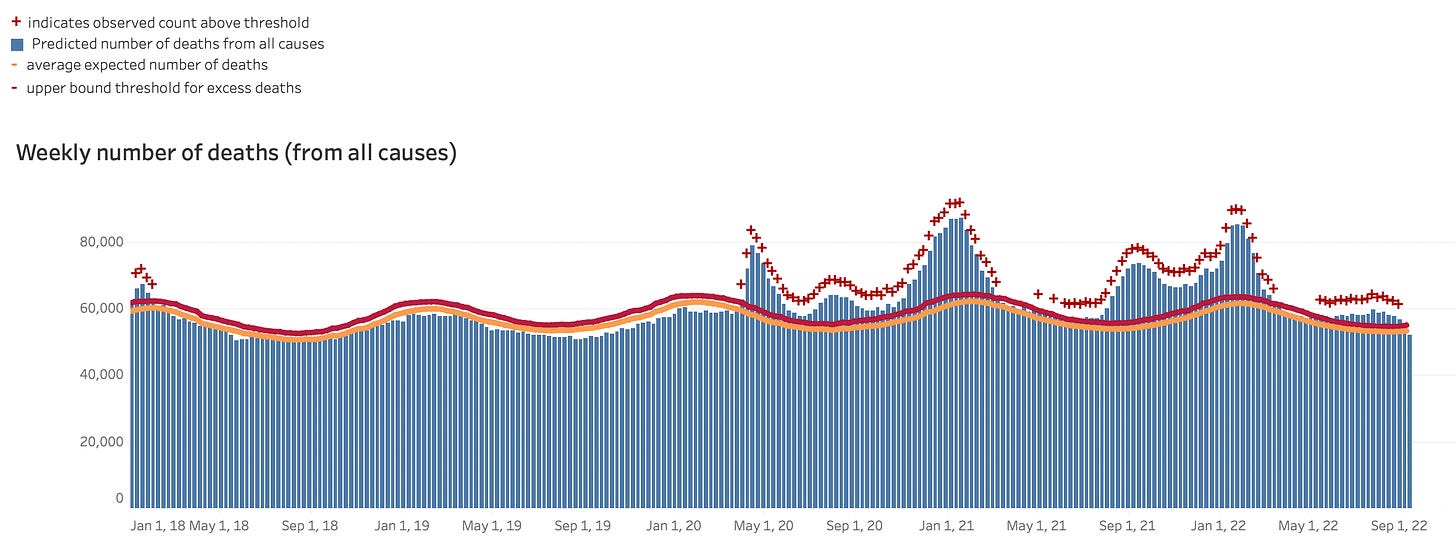This Week in the Mayonnaise Clinic: Is the Pandemic Over?
Plus: A reader says podcasts are making him feel inadequate, and another is worried the Fed is going to tank the economy by fighting inflation too much.
Dear readers,
Welcome to the Mayonnaise Clinic! This week, I have questions about COVID, inflation, and a mild mid-life crisis. Let’s dig into the jar.
Victor asks:
At the risk of branding myself the “COVID Rager” in the Very Serious community, I wanted to send you a clipping from the LA Times, front page, above the fold, which gets to the heart of something I continue to fret about when it comes to COVID: Misuse of “The Numbers.”
The last time I sent you a question, it was regarding how restrictions in Los Angeles County were pegged to dubious hospitalization stats. Now, this article purports to inform us that over 400 souls per day are still being lost to COVID each day. It uses as an illustrative example: a 73-year-old with failing kidneys who had voluntarily abandoned dialysis in the months prior to her death... from COVID? Seriously, are these reporters trolling us? And it’s not just them. The New York Times continues to publish each day a running total of cases, hospitalizations and deaths with no context whatsoever.
There have certainly been problems with the way hospitalization counts have been reported and used, because as the acute pandemic waned, the fraction of patients in hospitals who had COVID but were not actually there for COVID became large. But I do not share Victor’s skepticism of the death figures discussed here — neither their accuracy nor their implication about the mortality burden that COVID continues to cause.
When you look at all-cause mortality, it’s clearly true that there continue to be excess deaths materially above pre-pandemic levels in most weeks — albeit to a much lesser extent than during the most acute parts of the pandemic — and that life expectancy has declined.
And the CDC says that in 90% of cases where COVID is listed as a cause of death on a death certificate, it is listed as the underlying cause of death — that is, as the disease or injury that set off the chain of events that ultimately led to death. (And in other cases where COVID is listed just as a contributing cause, that doesn’t make it altogether irrelevant.) All of which is to say, I don’t doubt that COVID is leading to several hundred more deaths per day than we would have if it wasn’t around.
And that leads to a question the president threw right into the middle of the conversation this week: Is the pandemic over?
Anthony Fauci himself has waffled on this question — saying earlier this year that we were “out of the pandemic phase,” then walking that back and saying we are in a “transitional” phase, and then predicting that we will be in “more of an endemic situation” by the end of the year. Researchers at Yale think it might take a couple more years before we fully reach an endemic phase with a stable equilibrium for cases and deaths, even as the case-fatality rate has already fallen greatly from the most acute period of the pandemic. From an epidemiological perspective, I think it’s correct to say the pandemic is not over, but that it’s well on its way to ending.
But the president is not an epidemiologist. He is a political leader, and I took him to be talking about a political question — is the pandemic emergency over, meaning that COVID no longer calls for substantial alterations to the way government and society should operate? And the answer to that I think is mostly yes, and definitely yes in the specific context he was talking about: that events like the Detroit Auto Show, where he made the remarks, are properly back in person and bustling. Reduced death rates, greater population immunity, and widespread availability of tools individuals can use to address their own COVID risks are all reasons to resist continued non-pharmaceutical interventions and return to normal.
Of course, there were some problems with the president’s answer. One is that the policies of his administration often do not reflect his apparent view about the end of the pandemic emergency. He has relied (sometimes dubiously) on the existence of a pandemic emergency to justify ongoing policy actions, most notably the cancellation of hundreds of billions of dollars of student debt. We all knew that was a pretext, but he still probably shouldn’t have admitted it out loud.
The other possible problem with the answer is that there are still key steps that people should take to reduce their risk of getting, spreading, or dying of COVID. Most notably, they should get vaccine booster shots, which a majority of Americans have not done. (I got my updated booster last week — it’s easy at CVS.) But the president addressed that by also saying COVID remains a problem we are dealing with — a statement that will unfortunately remain true long after we’re out of the pandemic phase.
Alan asks:
I've had a constant struggle the last year with comparing what the Fed says to what my three small businesses are seeing in the economy. When the Fed said inflation wasn't a problem a while back, we saw our costs skyrocketing. Now, when the Fed is saying inflation is still terrible, we're seeing all of our costs either lowering or stable. Our B2B and B2C companies are both seeing drastic pullbacks in consumer demand, extreme slowing of growth, and stabilizing prices — all of which are exactly what the Fed intended, in order to slow the economy and control inflation. But from our perspective, the issue looks to be almost resolved: gas prices have come back to where they were, ocean freight and trucking prices are down more than 50% from their pandemic highs, and raw material costs have generally stabilized. The only people raising prices still are the ones that forgot to do so in the first place over the past year. So my question to you is, can you comfort my fears that the Fed is about to lead us over a catastrophic cliff because they're relying on data that is months old? Or are all of us small business owners doomed to be sitting ducks at this point?
Alan, it sounds like you’re in a goods-production or goods-distribution business, and the goods you produce or distribute are not food, so the inflation picture that you’re seeing is quite different from the economy-wide picture. You’re exposed to some of the consumption categories that experienced the sharpest inflation on the way up and where prices are falling rapidly now.1
Most of the economy consists of services, and services inflation has not moderated. Over the last three months, non-energy service prices have risen at a 7.5% annualized rate. The largest component of service spending is shelter — rents, including imputed rents for owner-occupied homes — and higher interest rates may have started to put a damper on those increases. But over the last three months, prices for other non-energy services have risen at about the same pace as shelter costs, meaning services inflation is not being especially driven by rents. Health care service prices, for example, also rose at a 7.5% annual pace over the last three months.
Food prices, meanwhile, rose at an 11.6% annualized rate over the last three months.
So my short answer is no — inflation fundamentals remain very concerning, significantly elevated headline inflation should return as soon as gasoline prices stop falling, and the Fed needs to keep hiking. You just happen to be seeing a part of the economy where inflation is relatively muted.
A reader in Austin asks:
I’m an early 30s dude, working a career as a spreadsheet guy at tech startups. With my wife, we’re a top 20% income household, but I feel like I’m not living up to some next-level possibility. All my life I’ve been a top performer at the big public schools I attended, but as I learn more about the world I realize how isolated I am from real levers of power.
I find myself consuming a constant stream of podcasts on high performers in business and tech. Tim Ferriss, Scott Galloway, Tyler Cowen, lots of political commentary — all of these feature top-1%+ performers talking about super interesting things they do. Then I look at my life and feel subpar.
I find myself constantly thinking I’m doing something wrong because I’m not, nor anyone around me, rich, influential, changing the world, featured on podcasts, blah blah blah. Is there any way to scratch that itch and network with successful people while I’m doing good but not "awesome"?
Keep reading with a 7-day free trial
Subscribe to Very Serious to keep reading this post and get 7 days of free access to the full post archives.





